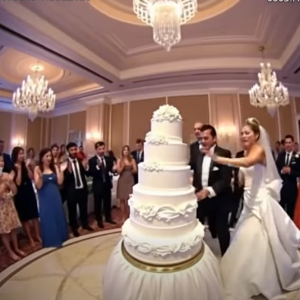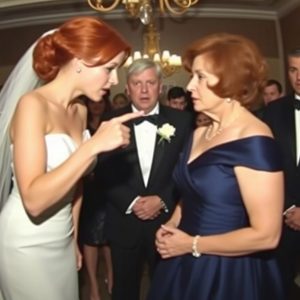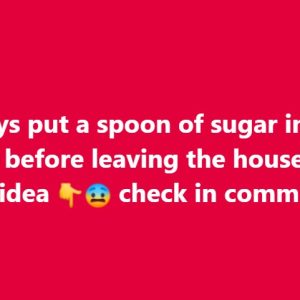I (34) am a nurse. My younger brother dropped out of college and never worked. My parents still paid off his debt and bought him a car—while I got nothing. My dad said, “You don’t need help.” I stayed silent. But at my wedding, my parents turned red when I thanked only my late grandmother for helping me through nursing school.
I’d worked two jobs back then, at a diner and a small clinic, just to afford rent and tuition. Every night I fell asleep with textbooks in my lap, waking up with a start when the coffee spilled on my notes. Grandma Esme would call and leave voicemails like, “You’re the strongest woman I know, Maribel.” I saved those messages like they were gold.
Meanwhile, my brother, Deacon, spent most days sleeping in, playing video games, and boasting to his friends about the new car Mom and Dad surprised him with. I’d hear him laughing through the thin apartment walls whenever I visited them for Sunday dinners. My parents would fawn over him, bringing him plates of food while I cleaned the dishes quietly in the kitchen. Dad would say, “You’re good, you don’t need spoiling.” I told myself it didn’t hurt, but the truth was it stung every single time.
My fiancé, Ellis, noticed it the first time he met my family. On the car ride home, he asked, “Do they always act like Deacon’s some kind of prince?” I shrugged. “He’s the baby. They think he’s fragile.” Ellis frowned. “No one’s that fragile at thirty.” His concern made me feel seen, and for the first time, I considered what it might be like to confront my parents. But the idea of a blow-up terrified me. I kept quiet.
As our wedding approached, I suggested a small ceremony—just immediate family and close friends. My parents objected. They wanted a big, lavish reception to impress their circle, despite never offering to contribute financially. Ellis and I stood firm; we budgeted carefully, booked a modest community hall, and decorated with handmade centerpieces. Friends helped set up. I felt proud of what we were building from scratch.
On the wedding day, as I stood beside Ellis at the reception, I knew I had a choice: keep pretending everything was fine, or speak my truth. When the moment came for speeches, my father looked smug, ready to take the microphone. But I asked to go first. I thanked Ellis, our friends, and my late grandma. I said, “Without Grandma Esme, I wouldn’t have made it through nursing school. She was the only one who believed in me when I felt alone.”
There was a collective gasp. My parents’ faces turned crimson. Deacon looked like he’d swallowed a lemon. For a second, I thought they’d storm out. But they stayed, sitting stiffly while the applause swelled around me. It was the first time I’d ever felt fully supported by the people who mattered most—my chosen family.
After the wedding, weeks passed without a word from my parents. I tried to shake it off, but it hurt deeply. When they finally called, Mom’s voice was brittle. “You embarrassed us,” she hissed. Dad demanded an apology. But I found my voice. I told them calmly, “I’m done pretending everything was fair. I love you, but I won’t lie anymore.” They hung up. For the first time in my life, I felt free.
The silence from my parents stretched into months. Deacon occasionally texted me half-hearted memes or random photos of his cat, but we both knew it wasn’t real connection. I focused on my marriage, my work at the hospital, and building a home filled with laughter and warmth.
One evening, Ellis found me crying on the bathroom floor after a long shift. A patient I’d grown attached to had passed away, and I couldn’t stop replaying their last moments. He sat beside me, his arm around my shoulders, whispering, “You don’t have to carry this alone.” I realized I’d spent my whole life believing I had to be strong because my family never gave me space to be vulnerable. Ellis showed me what real support looked like.
Three months after the wedding, I received a letter in the mail. It was from my parents’ lawyer. They wanted me to sign a document relinquishing any claim to their estate. My hands shook. I called Ellis, who came home immediately. We read it together at the kitchen table. It was clear: they were cutting me off entirely.
I cried, but it was a cleansing kind of grief. Ellis held me until I fell asleep on his chest. The next morning, I wrote a letter back. I told my parents I forgave them. I thanked them for teaching me self-reliance and resilience, even if it came at a painful cost. I wished them peace. I mailed it without expecting a reply.
Life began to settle. I poured myself into nursing, taking extra time to comfort anxious patients and teach new nurses with compassion. Ellis and I adopted a rescue dog, a scruffy terrier we named Pickle, who followed me everywhere. Our apartment felt like a true home.
Then, one rainy Tuesday, I got a call from a neighbor near my parents’ house. Mom had fallen in the driveway, unable to get up. Deacon was nowhere to be found. Without hesitation, I grabbed my bag and drove straight there.
When I arrived, Mom was shivering on the concrete, her ankle twisted badly. I knelt beside her, brushing wet hair from her face. Her eyes welled up when she saw me. “I didn’t know who else to call,” she whispered. I carried her inside and stayed by her side until the ambulance arrived.
At the hospital, I managed her pain meds and explained everything calmly to the doctors. Dad showed up an hour later, pale and shaken. He didn’t meet my eyes, but his voice cracked when he said, “Thank you.” For the first time in years, I saw fear and humility in his expression.
During Mom’s recovery, I visited every day. I didn’t do it for recognition. I did it because I still loved her, and I couldn’t bear to see her suffer alone. Slowly, the walls between us started to crumble. One afternoon, as I helped her adjust her leg brace, she asked, “Were we really that unfair to you?” Her eyes brimmed with tears.
I nodded, unable to find words. She started to sob, grabbing my hand. “I thought I was protecting you by pushing you to be strong. I didn’t realize I was hurting you.” I forgave her, and the weight I’d carried since childhood seemed to lift in that moment.
Deacon eventually showed up at the hospital. He shuffled in with a bouquet of half-wilted daisies, avoiding eye contact. When Mom fell asleep, he asked me, “Why are you doing all this?” I looked at him, really looked at him, for the first time in years. His eyes were bloodshot, his clothes rumpled. “Because someone has to,” I answered. “And because I still care, even if it doesn’t make sense.”
He started visiting more after that. I saw small changes in him—he offered to help around the house, took Mom to follow-up appointments, and even applied for a part-time job. It wasn’t perfect, but it was a start.
The biggest twist came a few months later. Grandma Esme’s old lawyer contacted me about her will. I’d assumed there was nothing left; she lived modestly and never talked about money. But she’d quietly invested in a small apartment building decades ago, and her shares were now worth more than I could imagine. She’d left everything to me.
Ellis and I sat stunned in the lawyer’s office. I thought of all the times I wanted to give up but heard Grandma’s voice cheering me on. It felt like she’d reached down from heaven to give me one last push. We used the inheritance to buy our first house and set up a scholarship in Grandma’s name for nursing students who, like me, had no one to help them.
When I told my parents about the scholarship, Dad’s eyes filled with pride. He hugged me tightly, something he hadn’t done since I was a child. Mom whispered, “She’d be so proud of you.” For the first time, their love felt unconditional.
Deacon surprised everyone by enrolling in community college. He started with basic courses, and every week he’d call to share a new fact he learned, like a kid discovering the world for the first time. I cheered him on, remembering the lonely nights I’d spent in the library, and felt grateful he was finally trying.
Our family dinners became a tradition again. We’d gather at our new house, with Ellis grilling on the patio and Pickle chasing sticks across the yard. The conversations weren’t always easy—sometimes old wounds resurfaced—but we faced them together.
One evening, as we watched the sunset from the porch, Dad turned to me and said, “You were always the strong one, but I should have told you how proud I was.” Tears pricked my eyes as I whispered back, “It’s never too late.”
In the end, I learned the hardest truth: you can’t force people to see your worth. But when you stand up for yourself with honesty and love, you give them a chance to change. Sometimes they do, sometimes they don’t—but you’ll always find peace in knowing you stayed true to yourself.
I hope my story reminds you that it’s okay to speak your truth, even if it makes others uncomfortable. Healing takes time, but love—real love—finds a way.
If you found this story meaningful, please share it and leave a like. You never know who might need to hear they’re not alone.






